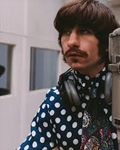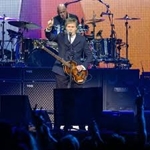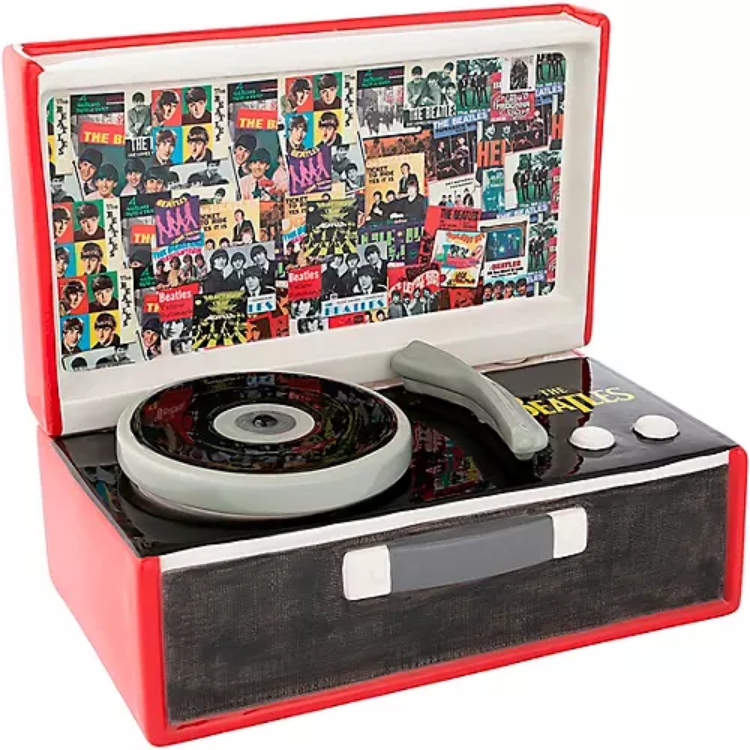- Register
- Log in to Tune-In
- Wishlist (0)
-
Shopping cart
(0)
You have no items in your shopping cart.
Beatles News

The 33-year-old Irish actor, who portrays Ringo Starr in a four-part Beatles film series, has acquired an Alsatian for personal protection. Keoghan has spoken about dealing with intense public attention, especially following his breakup with American pop superstar Sabrina Carpenter, 26. Social media clips show him engaging Duke with a blue chew toy.
A trainer from Lawless K9 shared, "During a recent visit, we got to get some great bonding in with Barry and Duke, and they got the opportunity to work together, which was really nice to see. Barry naturally picked it up fast. "Plenty more to come from Duke, lots of training and development.
He has been nurtured and trained by us to make sure he is a well-rounded dog, and his protection training is done correctly over time and not forced.", reports the Irish Mirror.
Keoghan, known for his role in the thriller Saltburn and a Bafta winner for The Banshees of Inisherin, recently flaunted the mop-top hairstyle he's sporting to play Ringo at a red carpet event.
All four Beatles films, each spotlighting a different band member, are set to be released simultaneously in 2028. Paul Mescal will portray Paul McCartney, Harris Dickinson will pla details

It's not at all easy to choose favorites, as there are just so many to choose from. What makes it a bit simpler would be the albums Band on the Run and Venus and Mars, which in this writer's opinion are McCartney's post-Beatles masterpieces. Material from those two records take up the majority of this list, but it's still difficult to pin down which of those tracks to put here. "Picasso's Last Words (Drink to Me)" is a lovely anthem that also serves as an intricate and unpredictable callback to "Jet" (which is great in itself). "Rock Show" is fun, but also has a terrific mini-jam at the end that's driven by a piano riff worthy of the gods. There are also more easy-going songs like "Listen to What the Man Said" and "Bluebird," but anyone can choose their favorites and not be wrong. Ranked by complexity, cohesion, and catchiness, here are McCartney's ten best post-Beatles songs.
10 "Mrs. Vanderbilt"
'Band on the Run' (1973)
The bassline in "Mrs. Vanderbilt" is just as exciting as the acoustic guitar; together they create an excellent foundation for a song that is relatively simple in structure and avoids being over-produced. McCartney's playfully hurried vocals in the first verse are the perfect start to the son details

The world is extremely familiar with the Fab Four–four musicians from Liverpool formally known as the Beatles, who emerged in the 1960s and changed the course of rock ‘n’ roll forever with their innovative songwriting, varied discography, and hit-after-hit reputation. The Beatles set the standard for every artist who followed in their footsteps, which is why the upcoming biopics must showcase the group’s legacy with the utmost respect – but is Hollywood up for the job?
Sam Mendes, the director of Hamnet (2025), 1917 (2019), and American Beauty (1999), is set to direct a series of four separate Beatles films to be released in April 2028. The cinema extravaganza will retell the band’s compelling history, with each film dedicated to the unique perspective of each member. This past January, the first pictures from the biopics were released to the public, showing the cast’s “transformation” into the iconic rock stars.
Casting was announced back in March 2025, featuring Paul Mescal as Paul McCartney, Harris Dickinson as John Lennon, Joseph Quinn as George Harrison, and none other than Barry Keoghan as Ringo Starr. Well-known actors Mia McKenna-Bruce, Saoirse details

The announcement that Farhan Akhtar will play Ravi Shankar comes with an image most people already recognise: Shankar on stage at The Concert for Bangladesh, quietly changing the rules of what popular music could be used for. That moment in 1971, when George Harrison helped organise the first major charity concert in rock history at Shankar’s urging, was not a late-career footnote. It was the culmination of an influence that had begun years earlier, when a sitar entered the Beatles’ world and refused to behave like a pop instrument.Ravi Shankar did not merely lend the Beatles a sound. He introduced them to discipline, to seriousness, and to the idea that music could carry moral weight without becoming spectacle. The sitar was not a prop
When the sitar entered Beatles music, it was immediately treated in the West as a symbol. But to Ravi Shankar, it was never symbolic. It was a demanding classical instrument rooted in lineage, years of apprenticeship, and a relationship between teacher and student that left no room for shortcuts.That difference in attitude created an early tension. Shankar would later say of the first sitar-heavy Beatles track, “I was very shocked. I didn’t like it at all.” details

It appears likely that 2026 will be a busy year for Paul McCartney, who may tour again as well as release a new album for the first time in years.
During a Q&A following a screening of the new Prime Video documentary, Man on the Run, in New Orleans, Louisiana, McCartney's longtime manager, Scott Rodger, provided updates on the former Beatles member (via Calico Skies Radio).
According to Rodger, McCartney is planning on touring later in the year. While the full list of countries he will visit was not revealed, Rodger said he would visit Japan. If this is true, this will mark McCartney's first concerts in Japan since the 2018 leg of the Freshen Up Tour.
Additionally, Rodger mentioned that McCartney's next album is complete. What's holding it up from being released is the cover artwork. It sounds like McCartney is taking his time organizing it.
When will Paul McCartney tour in 2026?
If McCartney tours in 2026, it will likely occur late in the year. Over the last two years, McCartney has only performed from September to December. The 2022 leg of the Got Back Tour did start in the spring, but it may be too close to announce spring tour dates.
In 2025, he announced his 2025 slate of sh details

Ringo Starr replaced Pete Best as The Beatles' drummer in 1962. Rumors cited jealousy, but Lennon insisted Best was fired for poor drumming. Best's popularity with female fans fueled speculation about his departure.
Nowadays, it’s hard to imagine anyone else playing drums for The Beatles except for Ringo Starr.
While Starr may not have been in the band’s original lineup when the group was first starting off, he nevertheless lived up to his position within the Fab Four, pairing remarkable well to the musical talents of John Lennon, Paul McCartney and Ringo Starr.
Yet to this day, most music fans can’t help but wonder what history might have been like if Starr’s predecessor, Pete Best, had remained in The Beatles as the group achieved increasing popularity the world over.
Among the founding members of The Beatles, Best served as the band’s drummer from 1960 to 1962. Though a decent enough performer, Best’s fellow bandmates apparently viewed Best’s abilities as a drummer with indifference, believing he lacked the proper talent to be a member of The Beatles.
Over the years, many hypothesized that The Beatles’ firing of Best owed large details

Director Sam Mendes is rounding out the call sheet for “The Beatles — A Four-Film Cinematic Event,” his upcoming cinematic extravaganza about the wildly popular British band.
“Bhaag Milkha Bhaag” star Farhan Akhtar will portray influential Indian composer Ravi Shankar, “Bohemian Rhapsody” actor Lucy Boynton is joining as British actress and girlfriend of Paul McCartney Jane Asher, “The Lord of the Rings: The Rings of Power” breakout Morfydd Clark will play John Lennon’s first wife Cynthia Lennon, and “Industry’s” Harry Lawtey has been cast as the band’s original bass guitarist Stuart Sutcliffe. They’ll star alongside Paul Mescal as Paul McCartney, Harrison Dickinson as John Lennon, Barry Keoghan as Ringo Starr and Joseph Quinn as George Harrison in “The Beatles — A Four-Film Cinematic Event.”
As the title suggests, Mendes is making four separate movies — one from each Beatles member’s point of view — that will intersect to capture the band’s improbable journey from Liverpool to the center of global culture, leading to their 1970 breakup. This marks the first time that App details

The Beatles drummer Ringo Starr, born Richard Starkey, married hairdresser Maureen Cox at Caxton Hall in London.
Beatles manager Brian Epstein served as Ringo’s best man, with John Lennon and George Harrison both acting as witnesses.
The couple had three children, future drummer Zak Starkey, born in 1965, Jason Starkey, born in 1967, and Lee Starkey, born in 1970.
The couple divorced in 1975. Cox died from leukemia in December of 1994.
Cox will be portrayed by British actress Mia McKenna-Bruce in Sam Mendes’ four Beatles films, The Beatles — A Four-Film Cinematic Event, which will hit theaters in April 2028. Starr will be played by Barry Keoghan.
In April 1981, Starr married actress Barbara Bach, who he met on the set of the film Caveman. They are still married to this day.
Source: Jill Lances/1430wcmy.com
details

From Liverpool to the world, The Beatles sang across nearly every genre and explored countless corners of the globe. The quintessential British quartet — John Lennon, Paul McCartney, George Harrison, and Ringo Starr — started out as a working-class band, juggling their music with blue-collar jobs. By the latter half of their careers, however, they had seen much of what the world had to offer, providing more than enough inspiration to write over 200 songs in just eight active years. One of those songs would later find an unexpected home with one of this generation's most influential pillars of pop culture: Marvel Comics. "The White Album" Jumped from British Blues to Country Tales Like "Rocky Raccoon". Surrounded by press, The Beatles wave at fans as they arrive in New York City in 1964.
"Rocky Raccoon" is far more narrative than introspective, telling the story of a young, feisty boy named Rocky Raccoon. Set in the "black mining hills of Dakota," the song follows Rocky after his woman runs off with another man, leaving him humiliated and nursing a black eye. Refusing to let the slight go, Rocky checks into a local saloon, armed with a gun, and storms into the room next to his. When he bursts details

Let’s begin today with some trivia. Who is the only performer to receive a separate guest credit on the label of a Beatles single?
You, the one yelling “Billy Preston!” loudly at the screen: You are correct. The 1969 “Get Back/Don’t Let Me Down” single is credited to “The Beatles With Billy Preston,” in honor of the virtuosic keyboardist responsible for that indelible Fender Rhodes solo.
Preston has been on my mind since the 2021 release of Peter Jackson’s docuseries “The Beatles: Get Back,” which served, among other things, as a reminder just how crucial the Texas-born keyboard prodigy was to the “Let It Be” sessions. (Given his effortless playing style and the good-natured way he diffused tension on the studio, John Lennon basically asked him to join the band.) But I’ve been listening to Preston, and specifically his Beatles covers, after catching a preview screening of Paris Barclay’s documentary about his charmed but troubled life, “Billy Preston: That’s the Way God Planned It,” which will be playing in New York later this month.
Preston’s covers got me thinking about how many fantastic & details

Even before the age of social media and the bottomless scroll, musicians were fighting against the general public’s relatively short attention span. (First impressions and all that.) More often than not, a listener would know whether they liked a song within the first few seconds, which made those first few seconds all the more important. And on February 11, 1963, The Beatles recorded a song introduction that would become synonymous with the group, all while calling back to a musical idol.
The Beatles recorded “I Saw Her Standing There” as part of an impressive recording session that saw the Fab Four record Please Please Me in one day. Although undoubtedly a big undertaking for the band and engineers alike, that big day in EMI Studios wasn’t entirely different from what The Beatles were already used to after cutting their teeth at nightclubs that expected them to play for hours on end. And it was just this kind of live feel that producer George Martin was after.
For this reason, Martin advised the band to count in their own numbers like they would if they were on stage. The end result is one of the most iconic intros in The Beatles discography and a subtle homage to the King of Rock &lsqu details

Oh, to be a fly on the wall in EMI Studios on February 10, 1967. If not for the superb vantage point, for the elbow room—it was a crowded affair in the recording room that day, with The Beatles, their star-studded group of pals, studio engineers, George Martin, and 41 professional symphonic musicians all in attendance. Everyone was there to put in some serious work, but one wouldn’t know it by looking at them. February 10 marked the fourth recording session for “A Day In The Life”, the expansive, controversial, and multi-faceted closing track to Sgt. Pepper’s Lonely Hearts Club Band. Members of the Royal Philharmonic and London Symphony Orchestras were there to record the cacophony that separates John Lennon’s somber first verses (“I read the news today, oh boy…”) with Paul McCartney’s bouncy interlude (“Woke up, jumped out of bed, ran a comb across my head.”)
The musical task at hand was a challenging one. Most conservatory musicians prefer structure, and The Beatles were after the opposite. But with the help of George Martin’s arranging skills and a vast assortment of gag accessories like clown noises, clip-on nipples, and gorilla paws, eve details

It is no secret that Paul McCartney and John Lennon had a competitive relationship. However, when we hear about this relationship, it’s typically through eyes that have not shared the same lived experience. In other words, it’s not being told through a professional musician’s perspective. That being so, facts are misinterpreted, moments are embellished, and ultimately, the foundational truth is partially lost. One musician with a similar disposition who once set the record straight on the matter was Paul Simon.
When it comes to the greatest songwriters of all time, Paul Simon is certainly one of them, and do you think he got there without a competitive drive? No, as competition is arguably embedded in every endeavor, obtaining a great ambitious mission. Now, that competition doesn’t necessarily need to be against another person, as that competition can also be simply against yourself.
Regarding this drive, Simon states in the book Paul Simon: The Life by Robert Hilburn, “I wanted my own parade. That’s a competitive drive I had, for whatever reason, whether it was in my nature or it came from my family or from my neighborhood — probably a father thing.” T details

On February 9, 1961, The Beatles—John Lennon, Paul McCartney, George Harrison, bassist Stuart Sutcliffe, and drummer Pete Best—made their debut at The Cavern Club in Liverpool, 65 years ago. This lunchtime performance marked the beginning of their 291-show residency at the venue, which was crucial for developing their stage presence before Ringo Starr joined in 1962.
Key details of this historical milestone:
The Lineup: The band featured the "Fab Five" lineup of Lennon, McCartney, Harrison, Sutcliffe, and Best.
The Gig: They played a lunchtime gig, reportedly earning £5, at the Mathew Street venue.
Significance: This performance helped establish them in the local scene, leading to their discovery by manager Brian Epstein.
Legacy: While Sutcliffe left soon after to pursue art and Best was replaced by Ringo Starr in August 1962, this 1961 date is considered a foundational moment in their rise to fame.
Source: Google
details
Barry Keoghan transformed into Ringo Starr as he was spotted filming scenes for the upcoming Beatles biopic.
The actor, 33, joins the cast as the legendary drummer alongside Paul Mescal as Paul McCartney, Harris Dickinson as John Lennon and Joseph Quinn as George Harrison. On Saturday, Barry looked the spitting image of the star, whose real name is Sir Richard Starkey, while on set.
He donned an oversized fur jacket layered over a striped purple shirt, paired with cropped trousers for the retro look. Barry also grew out a beard and styled his hair in Ringo’s classic shaggy cut, finishing the transformation with sunglasses as he filmed scenes.
The Daily Mail revealed that the Beatles biopics will be filmed at London's iconic Abbey Road Studios, with production getting underway in November last year despite earlier reports that plans had been blocked.
Barry Keoghan transformed into Ringo Starr as he was spotted filming scenes for the upcoming Beatles biopic. The actor, 33, joins the cast as the legendary drummer alongside Paul Mescal as Paul McCartney, Harris Dickinson as John Lennon and Joseph Quinn as George Harrison. While it was previously claimed that Westminste details

